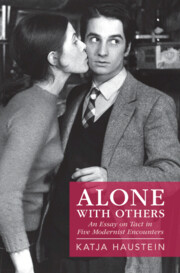Book contents
- Alone with Others
- Alone with Others
- Copyright page
- Dedication
- Epigraph
- Contents
- Preface
- Abbreviations
- Introduction
- Chapter 1 Tact’s History
- Chapter 2 Proxemics (Proust)
- Chapter 3 Alienation (Plessner – Adorno)
- Chapter 4 Individuation (Truffaut)
- Chapter 5 Approchement (Barthes)
- Coda
- Acknowledgements
- Notes
- Bibliography
- Index
Chapter 4 - Individuation (Truffaut)
Published online by Cambridge University Press: 26 October 2023
- Alone with Others
- Alone with Others
- Copyright page
- Dedication
- Epigraph
- Contents
- Preface
- Abbreviations
- Introduction
- Chapter 1 Tact’s History
- Chapter 2 Proxemics (Proust)
- Chapter 3 Alienation (Plessner – Adorno)
- Chapter 4 Individuation (Truffaut)
- Chapter 5 Approchement (Barthes)
- Coda
- Acknowledgements
- Notes
- Bibliography
- Index
Summary
Chapter 4 reads Truffaut’s Stolen Kisses (1968) in the light of the historical crisis from which it arose. Mapping the film against selected material from earlier versions of the script, director’s notes, letters, and interviews, I interpret Stolen Kisses against the grain of its conventional reception as a romantic comedy. I show how, while sympathetic to the revolutionary cause, the film occupied a bystander position in relation to the political parties involved in the conflict. Against ideologies of fusional collectivity, Truffaut experiments with new forms of individuality, freedom, and communication. In striking resemblance to Plessner’s theory of tact, he shows how tactful behaviour can facilitate ways to come close to one another without meeting, and drift apart again without damaging one another through indifference. Counter to the widespread expectation that when relations are close, they are warm, and when they are warm, they are beneficial to all individuals involved, intimacies do not necessarily bring us closer together. On the contrary, inasmuch as they may infringe upon the singularity and dignity of the individual, they can have a deeply alienating effect.
- Type
- Chapter
- Information
- Alone with OthersAn Essay on Tact in Five Modernist Encounters, pp. 83 - 100Publisher: Cambridge University PressPrint publication year: 2023

